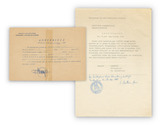Oskar Pastior
Oskar Pastior
Die Begriffe „Exil“ und „Emigration“ nehme ich für mich nicht in Anspruch, es sei denn auf einer metaphorischen Ebene, das heißt, mein Leben lang und wo immer.
[I do not make claims to the terms “exile” and “emigration”, unless on a metaphorical level, which means, all my life and wherever. (ed. trans.)]
Oskar Pastior, 1976
| Born | on 20 October 1927 in Hermannstadt (Sibiu), Romania |
|---|---|
| Died | on 4 October 2006 in Frankfurt am Main, Germany |
| Exile | Federal Republic of Germany |
| Profession | Writer |
The experimental poet Oskar Pastior belonged to the German minority in the Romanian Hermannstadt (Sibiu). In January 1945, the then 17-year-old student was kidnapped and taken to a Russian labour camp, where he survived hunger, cold, disease and hard labour. Nearly five years later he was released and returned to Romania. He completed his high school leaving certificate while performing his military service and from 1955 to 1960 he studied German at the University of Bucharest. He then worked as a radio producer and began to write. He developed in his poetry a language of his own. His poems also show clear references to the sound poetry of Dadaism.
Like many other artists and intellectuals, Oskar Pastior was monitored by the Romanian secret police Securitate. In 1968 he managed to defect during a study visit to Vienna. He fled to Germany. From 1969 Pastior lived in West Berlin and established himself as a writer and translator. He always refused to be considered an exile – “there is no need for this adornment”. He received numerous literary awards, including most recently the Georg-Büchner-Prize, the award ceremony of which he did not attend: he died in 2006 during the Frankfurt Book Fair. In 2009, the novel Atemschaukel by the Nobel Prize winner Herta Müller was published, which is based upon Pastior’s story of being a forced labourer in the Soviet Union.
In 2010 it was revealed that Oskar Pastior had been a collaborator for Securitate under the code name “Otto Stein”.
Selected works:
Offne Worte (poems, 1964)
Gedichte (poems, 1965)
Vom Sichersten ins Tausendste (poems, 1969)
An die neue Aubergine (poems, 1976)
Anagrammgedichte (poems, 1985)
Das Hören des Genitivs (poems, 1997)
Further reading:
Text + Kritik. Zeitschrift für Literatur. Hg. von Heinz Ludwig Arnold. Heft 186: Oskar Pastior. April 2010
Predoiu, Grazziella: Sinn-Freiheit und Soinn-Anarchie. Zum Werk Oskar Pastiors. Frankfurt am Main: Lang 2004
Koepp, Jürgen H.: Die Wörter und das Lesen. Zur Hermeneutik Oskar Pastiors. Bielefeld: Aisthesis-Verlag 1990



